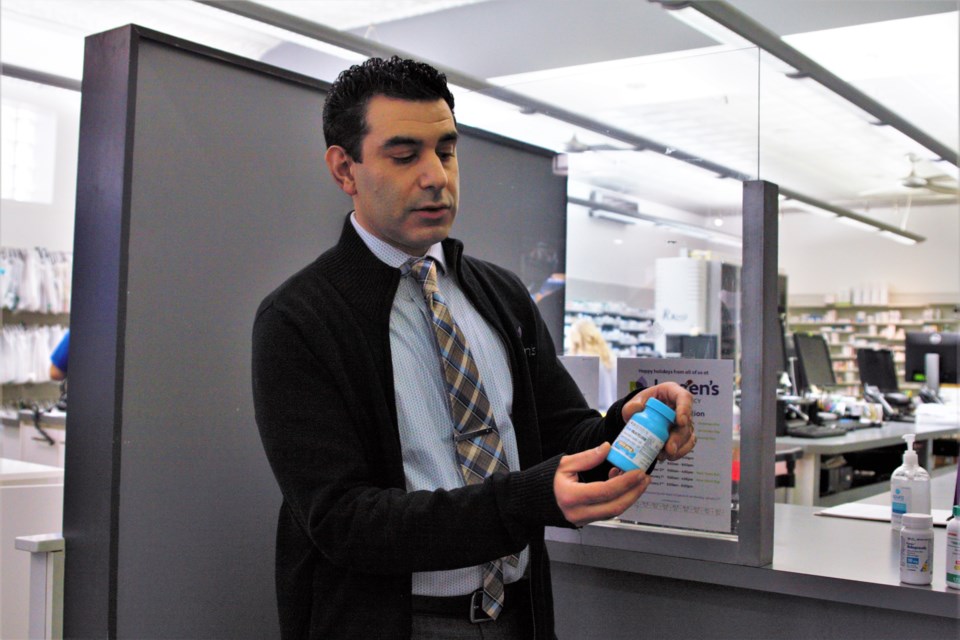THUNDER BAY — Local pharmacists say the province’s move to allow them to independently prescribe medication for a list of 13 minor ailments as of Jan. 1 will bring clear benefits for patients and the public health care system as a whole.
They also joined colleagues across the province in saying pharmacists could do more, like assessments and prescriptions for chronic conditions, if the province decides to open the door further in the future.
Under legislation passed by the Ford government, residents can seek prescriptions from pharmacists for common minor and short-term ailments including seasonal allergies, urinary tract infections, pink eye, cold sores, rashes, and insect bites.
All Ontarians are eligible to receive the service free of additional charges as long as they have a valid health card number or eligibility number.
Ontario is among the last provinces to allow some version of the practice, with Alberta first introducing legislation to enable pharmacist prescribing in 2007.
“People will be able to seek care for minor ailments faster, and this will reduce strain on hospitals, on clinics,” said John-Paul Federico, a pharmacist at Janzen’s Pharmacy. “Ultimately, this will help improve the efficiency of the health care system.”
Robyn Despins, a pharmacist and executive director of Oak Medical Arts, which operates four pharmacies in Thunder Bay, called the changes exciting.
“There’s lots of evidence that shows that pharmacists working in this scope of practice and being able to initiate therapy for minor ailments allows a little bit of a lighter load on emergency rooms and primary care physicians,” she said.
“I think in a community like Thunder Bay, where we’re really experiencing a lot of pressure on those systems … this is going to be a really exciting thing for access to care.”
The provincial government, which also recently allowed pharmacists to prescribe Paxlovid, a COVID-19 therapeutic, has said it hopes pharmacist prescribing will improve access to care in rural areas in particular.
Federico is cautiously optimistic.
“I would say [it could make] a significant difference, because a lot of patients go to walk-in clinics for minor ailments,” he said. “Now they can go to pharmacists.”
The Ontario College of Pharmacists is requiring pharmacists to complete a brief online orientation module around the new legislation by the end of 2023, said Federico.
Pharmacists are already “the drug therapy experts,” Despins said, expressing confidence members of her profession are well equipped to take up the new duties.
“There’s lots of resources already out there for pharmacists who want to get extra training to ready themselves, but we’ve really been doing this forever – this is how we were trained. We have a lot of clinical skills and assessment skills from our schooling.”
Pharmacists already commonly provide advice on over-the-counter medications for the ailments in question, Federico noted.
Both said they believe pharmacists could do more, if the province were to allow it.
“I think this is just the beginning," said Despins. "It’s a great opportunity to share that pharmacists have a lot more to offer than just what we think of when we think of the person in the white coat behind the counter dispensing a medication. Pharmacists really are drug therapy experts, and we can do a lot more clinical assessment than people might realize… I think this will be opening a door to many more expansions and evolutions to come in our practice.”
She noted some provinces, like Alberta, already allow pharmacists to prescribe for a much longer list of conditions. She believes Ontario is likely to follow that lead when citizens and leaders begin seeing the benefits.
Federico agrees.
“Pharmacists can probably contribute more to certain cardiovascular conditions, for instance, which are relatively easy to monitor through machines people can buy on their own,” he said. “So maybe in a few years we’ll see pharmacists able to prescribe medications independently for chronic conditions as well.”
Both pharmacies said they’re ready to offer the service to their customers as early as Jan. 1.
“We may see increases in volume and may have to adjust our staffing accordingly to make sure we can respond to that,” said Despins.
Just how significant public demand for the new service will be remains an open question, especially in the early days.
“I think there is a need for public awareness,” said Despins. “I’ve practiced in other provinces and done minor ailments [prescribing], and I noticed one of the biggest hold-ups was what people knew about what we could do.”
“But over time, as we continue to see our patients get those prescriptions from a doctor or from the emergency room, we just continue to educate them.”
The service is available to all Ontarians, but residents should keep in mind that doesn’t mean they’ll get a “guaranteed prescription,” Federico noted.
“That depends on the pharmacist’s assessment,” he said. “One of the outcomes could be a referral to a physician.”
The full list of ailments for which pharmacists will be eligible to prescribe for as of Jan. 1 includes:
- hay fever (allergic rhinitis)
- oral thrush (candidal stomatitis)
- pink eye (conjunctivitis; bacterial, allergic and viral)
- dermatitis (atopic, eczema, allergic and contact)
- menstrual cramps (dysmenorrhea)
- acid reflux (gastroesophageal reflux disease (GERD))
- hemorrhoids
- cold sores (herpes labialis)
- impetigo
- insect bites and hives
- tick bites (post-exposure prophylaxis to prevent Lyme disease)
- sprains and strains (musculoskeletal)
- urinary tract infections (UTIs)
